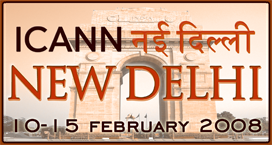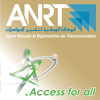Briefing Note: ICANN New Delhi Meeting
10-15 February, 2008
What was it?
This was one of three meetings held annually by ICANN as part of outreach
and policy development. It was ICANN’s 31st meeting and was hosted by ICANN
and the Indian Government and officially opened by Shri Jainder Singh, Secretary,
Department of Information Technology, the Government of India .
720 participants from 76 countries (290 were local business and Internet
interests) took part in domain name system discussions and other activities
including a session with business leaders from the Indian IT sector on the
secrets behind India’s success*.
Further information about the meeting, including presentations and transcripts,
is available at http://delhi.icann.org/.
What happened and what are the next steps?
New generic top level domains (gTLDS)
The process for introducing new gTLDs – TLDs are names like .COM, ORG and INFO
- was discussed in detail. Staff has been developing an implementation plan
based on the policy development work of one of ICANN’s supporting organizations,
the Generic Names Supporting Organisation (GNSO). The GNSO is the ICANN supporting
organization that makes recommendations to the Board on policy for generic
(gTLD) name space.
Implementation is a complex task that raises challenging technical, operational,
legal, economic and political questions that affect the domain name system.
Next steps: After review of staff implementation work, the Board will consider
a course of action on the GNSO policy recommendation for the introduction of
new gTLDs. There will be staff updates to the Board (including at an April,
2008 workshop) and publicly posted updates to the GNSO Council. ICANN expects
to start accepting bids for specific names at the end of 2008 at the earliest.
More information is available at http://www.icann.org/topics/new-gtld-program.htm.
Internationalized Domain Names (IDNs)
The introduction of IDNs – domain names in non-Latin scripts - will be one
of the biggest changes to the Internet since its inception.
Governmental Advisory Committee (GAC) and ccNSO (Country Code Names Supporting
Organisation) representatives met to discuss the potential introduction of
IDNs that are meaningful representations of countries or territories (i.e.,
ccTLDs - country code top-level domains). The GAC said that only governments
or relevant public authorities can provide authoritative advice to ICANN on
the legitimacy of any application for an IDN ccTLD.
A fast-track process for introducing IDN ccTLDs in the near-term was discussed.
The main issue was whether initial deployment would be limited in some way
per country or territory. For example, India has 22 official languages. Since
all these languages have official status in India, some think limitations in
the number of TLD strings should be tailored to the needs of each country or
territory.
Next steps: Clearly describe criteria for determining readiness to launch
IDN TLDs – part of the suggested fast-track process. A public comment period
on a draft initial report on fast-track implementation of IDN ccTLDs will close
on 26 February. This work is being led by the ICANN “IDNC” Working Group (comprised
of ICANN supporting organization and advisory committee members) that will
submit its final report to the ICANN Board in June, 2008.
More information is available at http://www.icann.org/announcements/announcement-01feb08.htm.
GNSO Improvements
The Generic Names Supporting Organization (GNSO) has undergone two independent
reviews and the Board will soon finalize recommendations for the GNSO’s improvement.
A Board Governance Committee working group developed a comprehensive proposal
to improve the effectiveness of the GNSO, including its policy activities,
structure, operations and communications, for the Board’s consideration and
approval.
Currently, the constituencies of the GNSO are made up of registries, registrars,
business and commercial users, Internet and communication service providers,
intellectual property interests and non-commercial users. The most contentious
issue was the proposal to change the structure of the GNSO Council to (i) create
a better balance between those organizations under contract with ICANN (e.g.,
registrars and registries) and those that are not, as well as between commercial
and noncommercial interests; and (ii) reduce the voting power of registries
and registrars.
Next steps: A thirty-day public consultation on the GNSO Improvements Report.
The Board will then decide whether and how to implement the report recommendations.
More information is available at http://www.icann.org/topics/gnso-improvements/.
Domain Tasting
Domain tasting is a practice that uses a contractual 5-day grace period to
register and delete names to test the market value of a domain name with
no upfront cost.
A proposal to eliminate tasting by charging the ICANN registration fee
for names deleted within the grace period was introduced as part of the
draft ICANN budget. The budget will be finalized in June 2008. The .BIZ
and .INFO registries have separately proposed changes to their contracts
(following the existing practice of .ORG) that would eliminate domain
tasting.
Next steps: The ICANN budget, including the proposal to eliminate tasting,
is being discussed with ICANN constituency groups. The community will consider
a proposal being developed by a GNSO drafting team at the next GNSO Council
meeting in March 2008.
More information is available at http://gnso.icann.org/issues/domain-tasting/gnso-initial-report-domain-tasting-07jan08.pdf [PDF,
293K].
Accountability and Transparency
The Board approved frameworks and principles on accountability
and transparency. These outline ICANN’s accountability as a California-based,
not-for-profit corporation with its own by law requirements and legal and corporate
accountabilities.
More information is available here: http://www.icann.org/announcements/announcement-10jan08.htm.
Joint Project Agreement (JPA)
The JPA is an agreement between the United States
government and ICANN for the purpose of transitioning the Internet domain name
system to private sector multi-stakeholder leadership. This agreement is in
the process of a mid-term review for which the United States Department of
Commerce’s National Telecommunications and Information Administration (NTIA)
is receiving comments.
The Board of ICANN believes the JPA has helped ICANN become a stable organization
and that ICANN is meeting its responsibilities. Concluding the JPA in September
2009 is the next logical step in transition of the domain name system to the
private sector. (See http://www.icann.org/correspondence/dengate-thrush-to-sene-09jan08.pdf
[PDF, 101K]).
A consultation on the JPA was held in New Delhi. Most participants agreed
on the need to have a discussion about the final ICANN model in the lead-up
to the conclusion of the JPA.
Next Steps: A public meeting is being held by the NTIA in Washington DC on
February 28, 2008 to receive further comments and to discuss feedback received
so far.
IPv6
This is a crucial issue for evolution and expansion of the Internet. Along
with many others in the Internet community, ICANN is acting to enable IPv6
services throughout the domain name system, including encouraging all providers
of domain name services to implement IPv6 capability. Already five root name
server operators have added IPv6 addresses to their root zone records, enabling
IPv6 DNS resolution. ICANN has produced a factsheet on IPv6 that is available
at http://www.icann.org/announcements/factsheet-ipv6-26oct07.pdf [PDF,
405K].
Next Steps: The Board directed ICANN staff to deploy IPv6 across its
own infrastructure and give regular feedback to the community on progress
and lessons learned.
Operations/Budget Planning
The Delhi meeting began ICANN’s operations and budget
planning for fiscal year (FY) 2009. A draft operating plan and budget was presented
for community discussion.
The public planning process has started 4 months earlier than previous years,
giving the community 6 months to discuss and refine the plan and budget.
Spending for FY 2009 is projected to be $57 million. The main cost drivers
are preparations for implementing new gTLDs and IDNs.
Next steps: Further community consultation followed by an updated draft Operating
Plan and Budget to be posted in May 2008. Final consultations and a decision
will be made at the next ICANN meeting in June.
More information is available at http://www.icann.org/planning/.
Registrar Failure
A workshop was held to discuss registrant protection and solutions to the
potential problems registrar failure may cause. In the interactive workshop,
participants considered three scenarios and were asked to devise solutions
to each.
Translation Program
The first draft of a Translation Program for ICANN was presented and discussed
in Delhi at a public meeting. The program outlines how ICANN can reach non-English
speakers and give them equitable access to and influence on ICANN processes.
Next steps: Feedback will be incorporated into a final report to be presented
to the ICANN Board for approval.
Further information is available at http://www.icann.org/announcements/announcement-13feb08.htm.
Next Meeting:
The next ICANN meeting will be held from 22-27 June 2008 in Paris, France.
All are welcome to attend. There will be sessions on IDN’s, the introduction
of new Generic Top Level Domains, IPv6 and the transition of domain name system
coordination to the ICANN model of multi stakeholder engagement with a strong
focus on ensuring security, stability and private sector leadership.
We look forward to your participation in the meeting.
Information about the next meeting will be on the ICANN website soon at http://www.icann.org/meetings/.
* Business leaders showcasing the India IT success story were: Saurabh Srivastava
(moderator), Chairman, Indian Venture Capital Association; Kiran Karnik, Former
President, NASSCOM, Ashok Soota, Chairman & MD, Mindtree Consulting Ltd,
Raman Roy, CEO, Quatrro and Ajay Chowdhry, Chairman & CEO, HCL.














